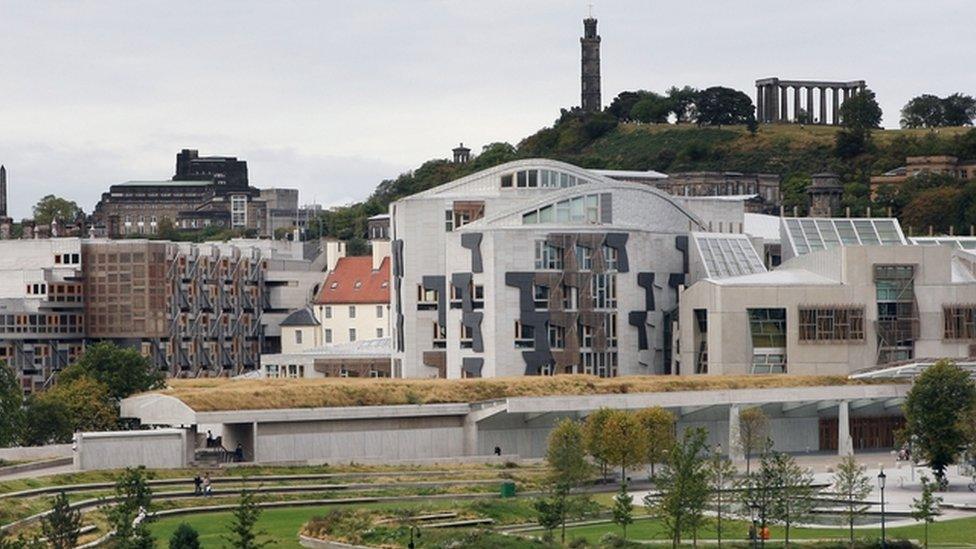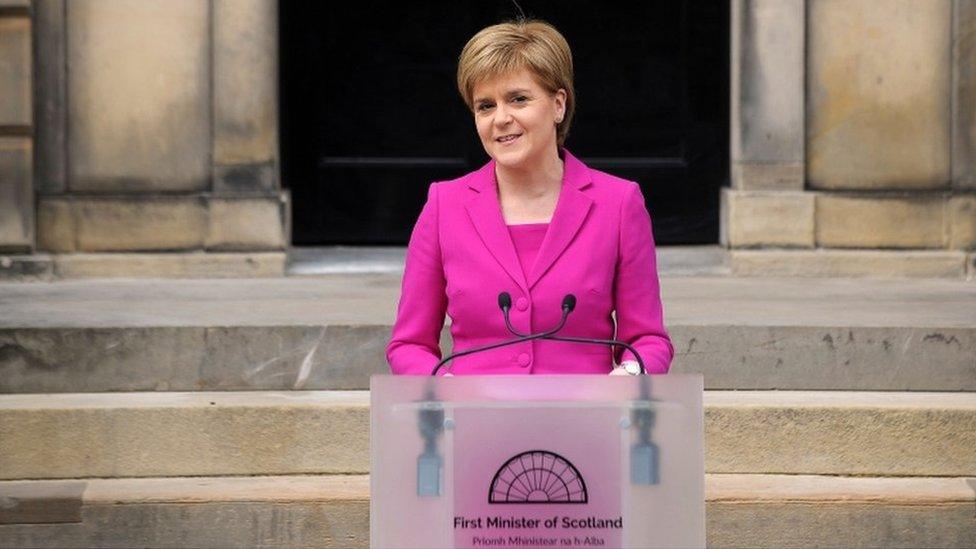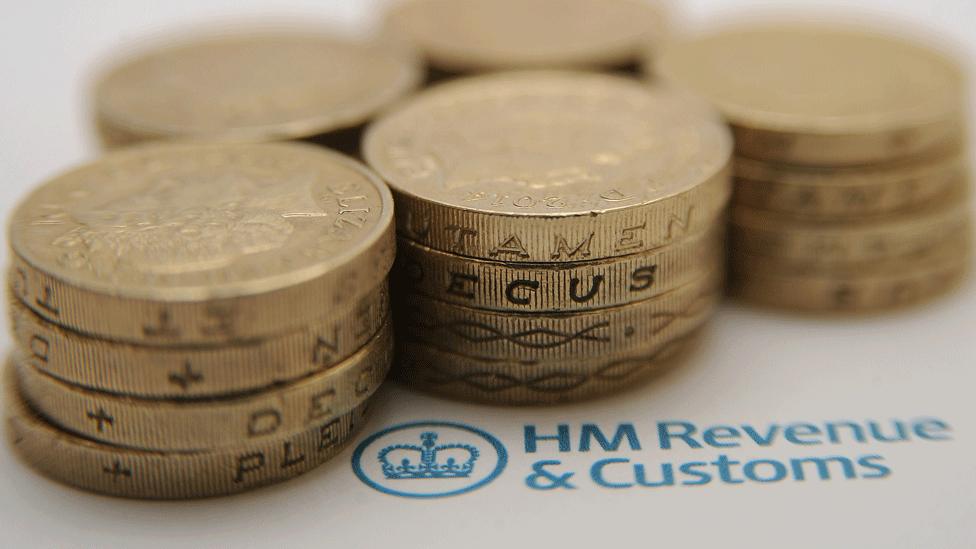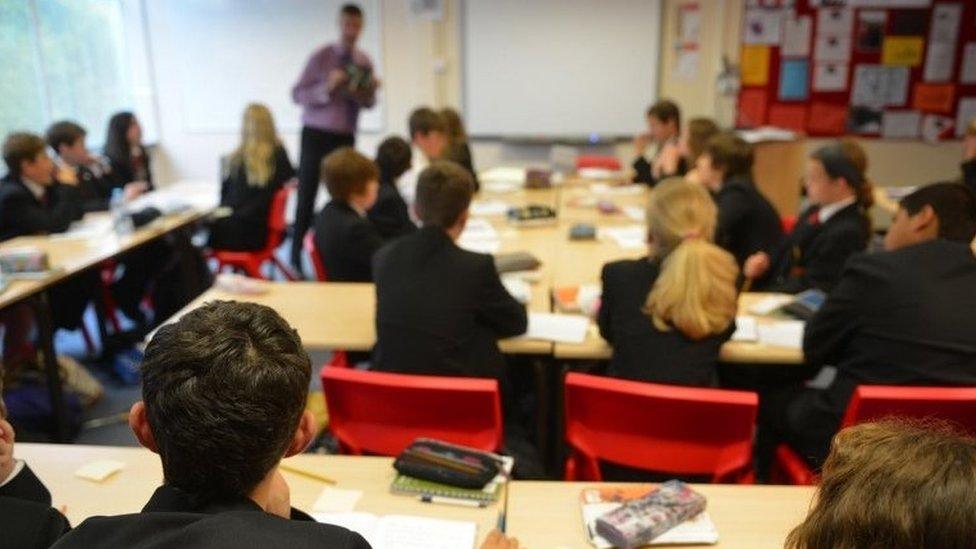Holyrood: Down to business for the SNP
- Published

Let's give a big hand to the electorate. After an election campaign that was lacking somewhat in the lustre department, the result was anything but.
The SNP won big, but not big enough for a majority. Labour was knocked into third place by a Tory surge. Lib Dems were knocked into fifth place by the Greens.
Independent MSPs have been squeezed out as the fault line of, yes, independence is now clearly established as being a dominant factor in shaping the party system.
Getting knocked back into a minority may be disappointing for Nicola Sturgeon, but it should be no surprise. The system was chosen to make it almost impossible to achieve what the SNP achieved in 2011.
So this result was more "normal" - if you could conceive of any system being normal which has five parties in play, one of which gets nearly half the votes.
Yes, for the third time, starting in 2011, the SNP has been hugely successful. The talk of Scotland being "a one-party state" is nonsense, and a bit of an insult to the electorate. The result shows it's a nation in which one party is (currently) being very successful.
Less abrasive
So much of the results. What happens next? It's ironic that the campaign was shaped by the issue of independence, and dominated by comparisons of income tax plans, yet Nicola Sturgeon will probably want to park both of these issues for the next five years.
Her Bute House speech, setting out her plans and ruling out a formal coalition, sent a number of messages to different audiences.
There was more emphasis on the environment than we heard through the campaign (she will want to work with Greens), on productivity (the Tories like that kind of economic talk) and "mitigating austerity" (which has been Kezia Dugdale's main campaign plank).

Nicola Sturgeon's Bute House speech on 6 May sent a number of messages to different audiences
Her top priority, improvements in educational attainment and fairness, is something on which she can expect to get some agreement across parties, including Lib Dems, for whom that was the big campaign issue.
Fixing deals with opposition parties to get votes through Holyrood may come easier to Nicola Sturgeon than it did to her predecessor, whose political management style was and remains - let's say - a bit more abrasive.
And she will have to be mindful of an SNP group at Holyrood which has been fiercely disciplined for nine years. It should be more difficult to keep it that way now that the referendum is in the past, and with the ministerial career ladder being blocked for some.
Tax reform
There was another audience for that speech - her party. By setting out a full programme of government activity, she is making clear that there is a lot of stuff for ministers to get on with.
Yes, the first minister and the rest of the SNP would no doubt be delighted to find a huge surge in support for independence. Her deputy, Stewart Hosie, has been given the job of re-booting that campaign from this summer, which will require a big revision of the 2013 white paper.
But if the polls don't show a surge, and the politics doesn't add up, then there's a good case for parking the issue until at least the election in 2021.

On new income tax powers, the SNP was attacked for its modest plans to alter George Osborne's bands and rates. That position didn't seem to do it much harm at all.
To shake up income tax, and to raise taxes as Labour, LibDem and Greens wanted, would absorb quite a lot of political capital, and provide a platform for Ruth Davidson and the Tories to push for further electoral gains.
The SNP manifesto has plans for council tax reform (also quite modest) and they are under a lot of pressure from business for big changes to non-domestic (business) rates. With limited time and a finite amount of political capital, that looks like the place the SNP ministerial team would be wise to focus its tax-reforming efforts.
Gold-plating
High on Nicola Sturgeon's 'to do' list is a ministerial reshuffle. She inherited Alex Salmond's cabinet shape, and tinkered a bit. She could tinker more. With lots more tax powers, independent experts have been advising that there should be a separate finance brief, rather than continuing John Swinney's wide-ranging role as money-gamekeeper-and-also-poacher.
It is being suggested that the deputy first minister should lose that finance role, to Keith Brown perhaps, while picking up the education brief. With his clout and experience in St Andrew's House, he would make a new Education and Economy brief ("The Smart Secretary" or "wiser and wealthier"?) the key component of the 2016-21 term.
Education reform looks likely to follow two strands, of standards and control. Teachers could be wooed with some response to their workplace concerns - cutting down, perhaps, on some councils' gold-plating of Curriculum for Excellence reforms.
The staffroom could then be harnessed in one of the big pushes we can expect, towards major changes to local councils.

As I noted from the SNP manifesto, Nicola Sturgeon has won a significant mandate to push control of schools towards teachers and parents, which necessarily means pushing control away from councils. That starts with a big tranche of new funding being directed at headteachers. She can be sure of at least Conservative support for that.
The councils have shown little appetite for a fight over such reforms - so far.
But if they want one, the first minister has an interview with the BBC Scotland's Glenn Campbell in her filing cabinet, in which she established that she sees herself having a mandate for council boundary reform, and perhaps a big cut in numbers. It's not her favoured route, as it's very time-consuming and expensive in financial and political capital. But it's an option.
NHS in transition
Public service reform continues with the health service. A tight budget and demographic change are forcing the SNP to shift from its previous populist stance that it would preserve your local services.
The ministerial team have been working towards reforms which their Labour/LibDem predecessors were trying to reach before 2007.
New centres for elective procedures, like the Golden Jubilee Hospital in Clydebank, should allow for more efficient management of relatively straight-forward hip replacements, cataract surgery, varicose veins and so on. More triage by nurses and allied professionals should ease up the pressure on GPs' scarce and expensive time.
While the pressure remains on acute services, there's a lot of change required in the NHS. The £500m extra promised in the manifesto, on top of inflation-related increases, is intended to help make that transition. Without doing so, the health experts are agreed that the NHS could crumble.
Brexit
And then there's the economy. The short term priority is to respond to a drumbeat of job losses. On election results day, it's included Tannoy audio gear manufacturing in Coatbridge and more jobs being lost from the collapsed Harkand oilfield services firm in Aberdeen.
It helped the campaign to pull the Lanarkshire steel plants out of the redundancy furnace, but it's hard going to keep fire-fighting as the economy slows.
Longer term, the manifesto points to moves on productivity. That's a tricky challenge, in that the problem is well known, but the solution is not. And whatever it is, it's not a quick fix. For Holyrood, as with Westminster, Something Must Be Done.
One reason the economy may be slowing, and across the UK, is the uncertainty over Britain's place in or out of the European Union.
That referendum campaign will be a big focus for the early weeks of the new administration. The SNP's position would be helped by a big "stay" vote in Scotland. But a UK "leave" vote could determine much of the next five years at Holyrood.